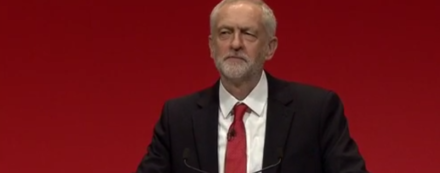
Yesterday Labour held a conference in London for members where the party set out its agenda to “take control” of the economy.
Jeremy Corbyn vowed to reverse the “neoliberal ideology that drove the privatisation frenzy” and John McDonnell said a Labour government would put services “irreversibly” in the hands of workers.
The leader and shadow chancellor said the plans would centre on accountability and “democratic management”. They reiterated Labour’s pledge to bring energy, rail, water and mail industries into public ownership.
Corbyn made ecological concerns a focal point and quoted Canadian political activist and author Naomi Klein. He also criticised the environment secretary, saying: “Nobody is fooled by Michael Gove’s reinvention of himself as an eco-warrior”.
Analysis
The conference speeches fed into Labour’s theme of “a rigged system”, “the wealthy elite” and “for the many, not the few”. It identifies a culprit – an effective way of mobilising activists and stirring up energy.
This is in distinct contrast to the Conservative Party, which is in desperate need of a strong message, as Stephen Bush has touched on before. It currently has no consistent argument other than “Labour is bad” and “Corbyn is bad”. Throughout Cameron’s era, Question Time audiences collectively groaned every time a Tory MP said the words “long term economic plan”, but it was effective.
Critics of Labour’s economic proposals have pointed to the similarities between the ideas being talked about by McDonnell and the infamous 1983 Labour manifesto. Yet the circumstances are vastly different. As well as a deeply divided party (and a split left wing of the party), Michael Foot suffered from the damage sustained during the Winter of Discontent, which had occurred just four years previously.
Today Labour’s radical plans follow decades of outsourcing and privatisation, which the public are increasingly weary (and wary) of, particularly in light of Carillion’s collapse and the NHS crisis. The unions have not exerted the kind of power they did in the 1980s since… well, the 1980s.
It is important to note that at the alternative models of ownership conference yesterday, McDonnell made clear that the plans do not attempt to emulate the nationalised industries of the past. Instead, it will promote the use of co-operatives.
Naturally, the scheme has been warmly received by the Co-operative Party, which the shadow chancellor announced would be setting up an implementation group. The affiliated party has separately commissioned a report from the New Economics Foundation to look further into the practicalities of boosting the co-operative sector.
There is a danger that, like the mansion tax in 2015, voters could feel positive towards Labour’s policies but short of confidence in the party’s ability to manage their implementation responsibly.
The key for the party is, as ever, appearing competent. That is not a particularly difficult task while May is allowed by Tory MPs to go on being used as a human shield, but it seems unlikely the Conservatives will enter the next general election with May at the helm.




More from LabourList
Nudification apps facilitate digital sexual assault – and they should be banned
Diane Abbott suspended from Labour after defending racism comments
Labour campaign groups join forces to call for reinstatement of MPs